Analyzing the Attainment of Equality for Japanese Women: An Essay
VerifiedAdded on 2023/04/06
|6
|1443
|361
Essay
AI Summary
This essay examines the complex journey of Japanese women towards equality, highlighting the persistent societal barriers they face despite legal advancements. It delves into the influence of Confucian ideals, which traditionally place women in subordinate roles within the family, emphasizing marriage, childbearing, and household management. The essay analyzes how these expectations, coupled with workplace disparities and the expectation of women prioritizing family responsibilities, contribute to an imbalance. While acknowledging legal reforms granting women rights and the increasing participation of women in the workforce, the essay underscores the slow pace of change and the continued prevalence of traditional gender roles. It concludes by emphasizing the need for Japanese women to navigate these roles to achieve true emancipation and pursue their ambitions.
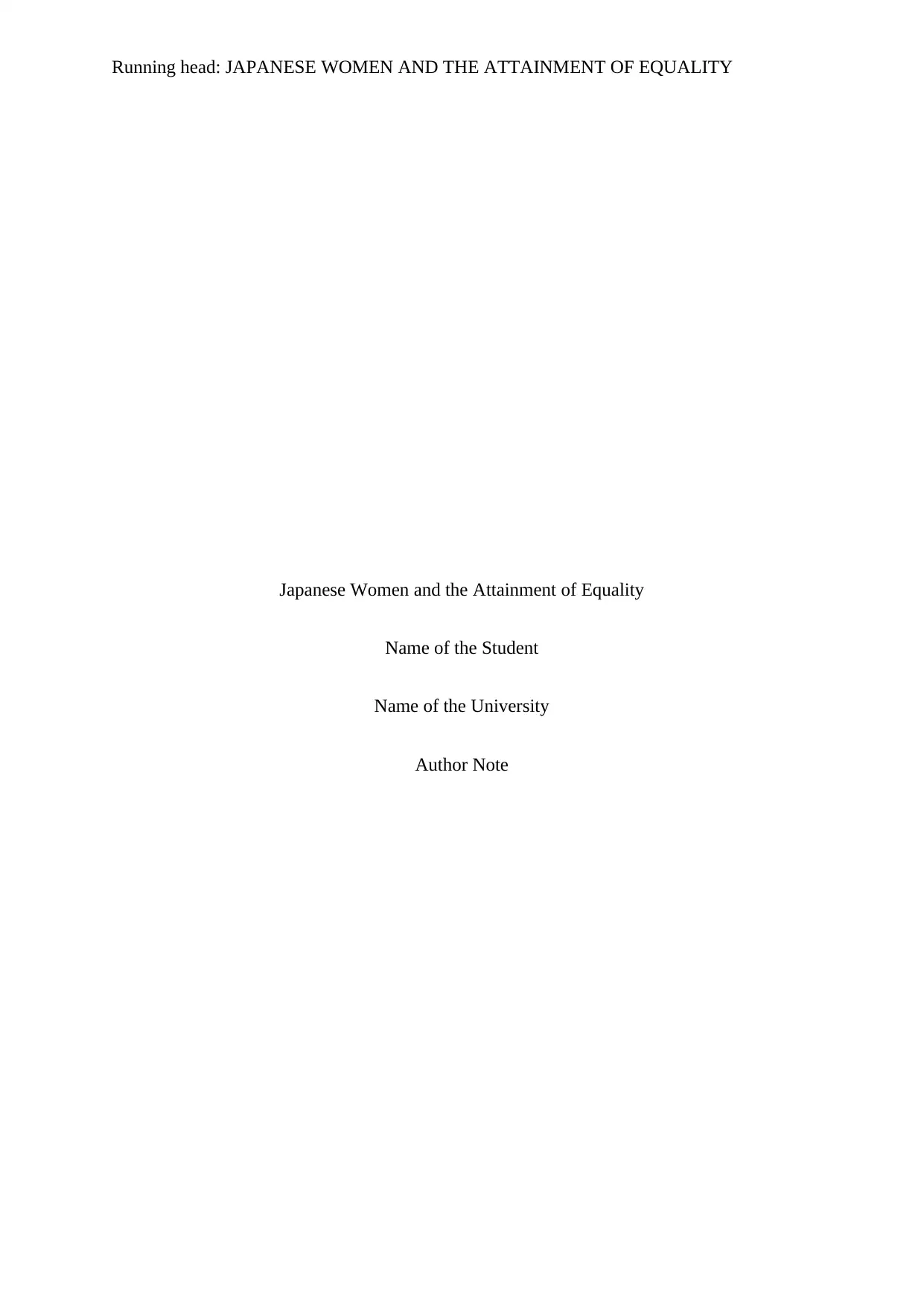
Running head: JAPANESE WOMEN AND THE ATTAINMENT OF EQUALITY
Japanese Women and the Attainment of Equality
Name of the Student
Name of the University
Author Note
Japanese Women and the Attainment of Equality
Name of the Student
Name of the University
Author Note
Paraphrase This Document
Need a fresh take? Get an instant paraphrase of this document with our AI Paraphraser
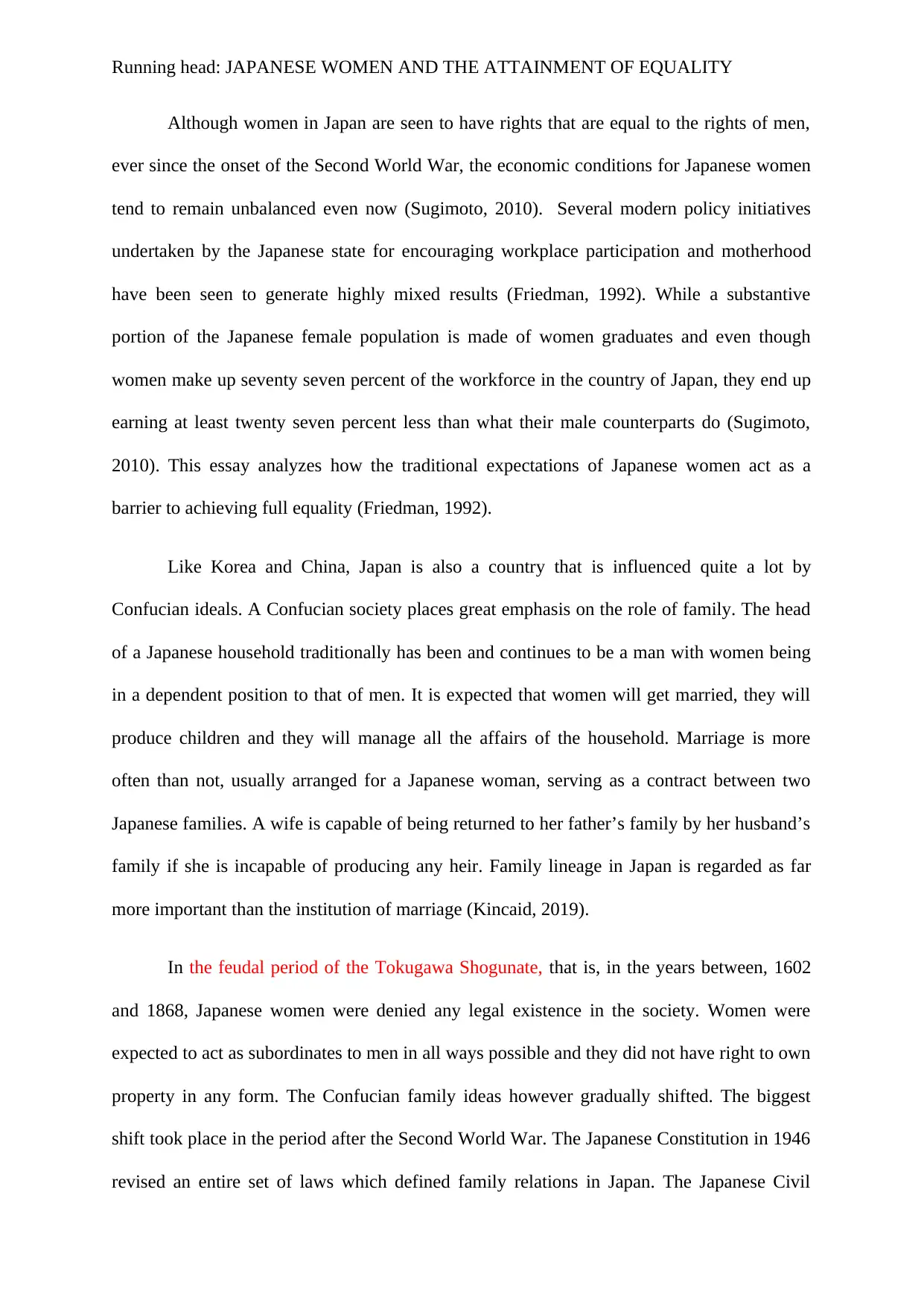
Running head: JAPANESE WOMEN AND THE ATTAINMENT OF EQUALITY
Although women in Japan are seen to have rights that are equal to the rights of men,
ever since the onset of the Second World War, the economic conditions for Japanese women
tend to remain unbalanced even now (Sugimoto, 2010). Several modern policy initiatives
undertaken by the Japanese state for encouraging workplace participation and motherhood
have been seen to generate highly mixed results (Friedman, 1992). While a substantive
portion of the Japanese female population is made of women graduates and even though
women make up seventy seven percent of the workforce in the country of Japan, they end up
earning at least twenty seven percent less than what their male counterparts do (Sugimoto,
2010). This essay analyzes how the traditional expectations of Japanese women act as a
barrier to achieving full equality (Friedman, 1992).
Like Korea and China, Japan is also a country that is influenced quite a lot by
Confucian ideals. A Confucian society places great emphasis on the role of family. The head
of a Japanese household traditionally has been and continues to be a man with women being
in a dependent position to that of men. It is expected that women will get married, they will
produce children and they will manage all the affairs of the household. Marriage is more
often than not, usually arranged for a Japanese woman, serving as a contract between two
Japanese families. A wife is capable of being returned to her father’s family by her husband’s
family if she is incapable of producing any heir. Family lineage in Japan is regarded as far
more important than the institution of marriage (Kincaid, 2019).
In the feudal period of the Tokugawa Shogunate, that is, in the years between, 1602
and 1868, Japanese women were denied any legal existence in the society. Women were
expected to act as subordinates to men in all ways possible and they did not have right to own
property in any form. The Confucian family ideas however gradually shifted. The biggest
shift took place in the period after the Second World War. The Japanese Constitution in 1946
revised an entire set of laws which defined family relations in Japan. The Japanese Civil
Although women in Japan are seen to have rights that are equal to the rights of men,
ever since the onset of the Second World War, the economic conditions for Japanese women
tend to remain unbalanced even now (Sugimoto, 2010). Several modern policy initiatives
undertaken by the Japanese state for encouraging workplace participation and motherhood
have been seen to generate highly mixed results (Friedman, 1992). While a substantive
portion of the Japanese female population is made of women graduates and even though
women make up seventy seven percent of the workforce in the country of Japan, they end up
earning at least twenty seven percent less than what their male counterparts do (Sugimoto,
2010). This essay analyzes how the traditional expectations of Japanese women act as a
barrier to achieving full equality (Friedman, 1992).
Like Korea and China, Japan is also a country that is influenced quite a lot by
Confucian ideals. A Confucian society places great emphasis on the role of family. The head
of a Japanese household traditionally has been and continues to be a man with women being
in a dependent position to that of men. It is expected that women will get married, they will
produce children and they will manage all the affairs of the household. Marriage is more
often than not, usually arranged for a Japanese woman, serving as a contract between two
Japanese families. A wife is capable of being returned to her father’s family by her husband’s
family if she is incapable of producing any heir. Family lineage in Japan is regarded as far
more important than the institution of marriage (Kincaid, 2019).
In the feudal period of the Tokugawa Shogunate, that is, in the years between, 1602
and 1868, Japanese women were denied any legal existence in the society. Women were
expected to act as subordinates to men in all ways possible and they did not have right to own
property in any form. The Confucian family ideas however gradually shifted. The biggest
shift took place in the period after the Second World War. The Japanese Constitution in 1946
revised an entire set of laws which defined family relations in Japan. The Japanese Civil
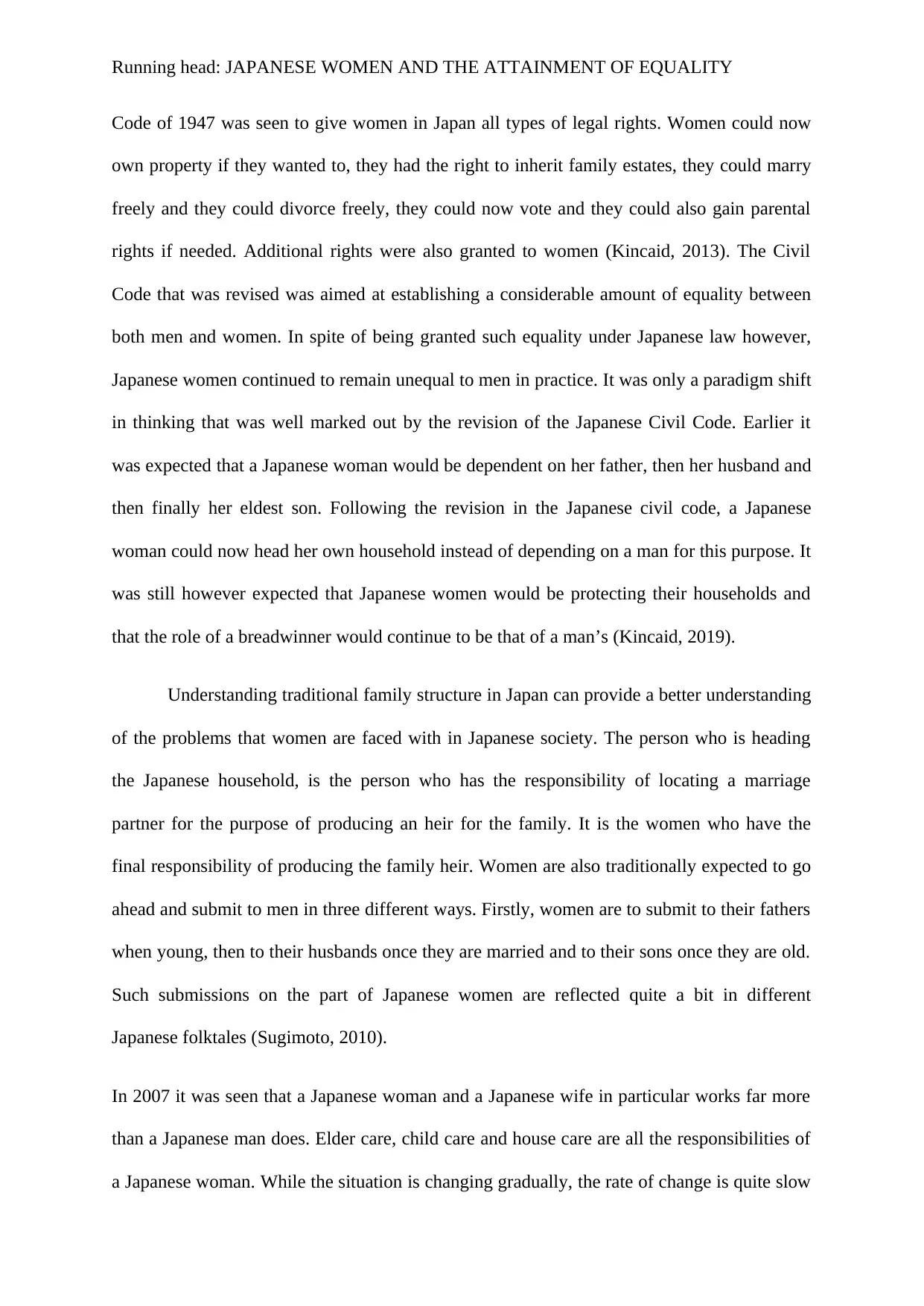
Running head: JAPANESE WOMEN AND THE ATTAINMENT OF EQUALITY
Code of 1947 was seen to give women in Japan all types of legal rights. Women could now
own property if they wanted to, they had the right to inherit family estates, they could marry
freely and they could divorce freely, they could now vote and they could also gain parental
rights if needed. Additional rights were also granted to women (Kincaid, 2013). The Civil
Code that was revised was aimed at establishing a considerable amount of equality between
both men and women. In spite of being granted such equality under Japanese law however,
Japanese women continued to remain unequal to men in practice. It was only a paradigm shift
in thinking that was well marked out by the revision of the Japanese Civil Code. Earlier it
was expected that a Japanese woman would be dependent on her father, then her husband and
then finally her eldest son. Following the revision in the Japanese civil code, a Japanese
woman could now head her own household instead of depending on a man for this purpose. It
was still however expected that Japanese women would be protecting their households and
that the role of a breadwinner would continue to be that of a man’s (Kincaid, 2019).
Understanding traditional family structure in Japan can provide a better understanding
of the problems that women are faced with in Japanese society. The person who is heading
the Japanese household, is the person who has the responsibility of locating a marriage
partner for the purpose of producing an heir for the family. It is the women who have the
final responsibility of producing the family heir. Women are also traditionally expected to go
ahead and submit to men in three different ways. Firstly, women are to submit to their fathers
when young, then to their husbands once they are married and to their sons once they are old.
Such submissions on the part of Japanese women are reflected quite a bit in different
Japanese folktales (Sugimoto, 2010).
In 2007 it was seen that a Japanese woman and a Japanese wife in particular works far more
than a Japanese man does. Elder care, child care and house care are all the responsibilities of
a Japanese woman. While the situation is changing gradually, the rate of change is quite slow
Code of 1947 was seen to give women in Japan all types of legal rights. Women could now
own property if they wanted to, they had the right to inherit family estates, they could marry
freely and they could divorce freely, they could now vote and they could also gain parental
rights if needed. Additional rights were also granted to women (Kincaid, 2013). The Civil
Code that was revised was aimed at establishing a considerable amount of equality between
both men and women. In spite of being granted such equality under Japanese law however,
Japanese women continued to remain unequal to men in practice. It was only a paradigm shift
in thinking that was well marked out by the revision of the Japanese Civil Code. Earlier it
was expected that a Japanese woman would be dependent on her father, then her husband and
then finally her eldest son. Following the revision in the Japanese civil code, a Japanese
woman could now head her own household instead of depending on a man for this purpose. It
was still however expected that Japanese women would be protecting their households and
that the role of a breadwinner would continue to be that of a man’s (Kincaid, 2019).
Understanding traditional family structure in Japan can provide a better understanding
of the problems that women are faced with in Japanese society. The person who is heading
the Japanese household, is the person who has the responsibility of locating a marriage
partner for the purpose of producing an heir for the family. It is the women who have the
final responsibility of producing the family heir. Women are also traditionally expected to go
ahead and submit to men in three different ways. Firstly, women are to submit to their fathers
when young, then to their husbands once they are married and to their sons once they are old.
Such submissions on the part of Japanese women are reflected quite a bit in different
Japanese folktales (Sugimoto, 2010).
In 2007 it was seen that a Japanese woman and a Japanese wife in particular works far more
than a Japanese man does. Elder care, child care and house care are all the responsibilities of
a Japanese woman. While the situation is changing gradually, the rate of change is quite slow
⊘ This is a preview!⊘
Do you want full access?
Subscribe today to unlock all pages.

Trusted by 1+ million students worldwide
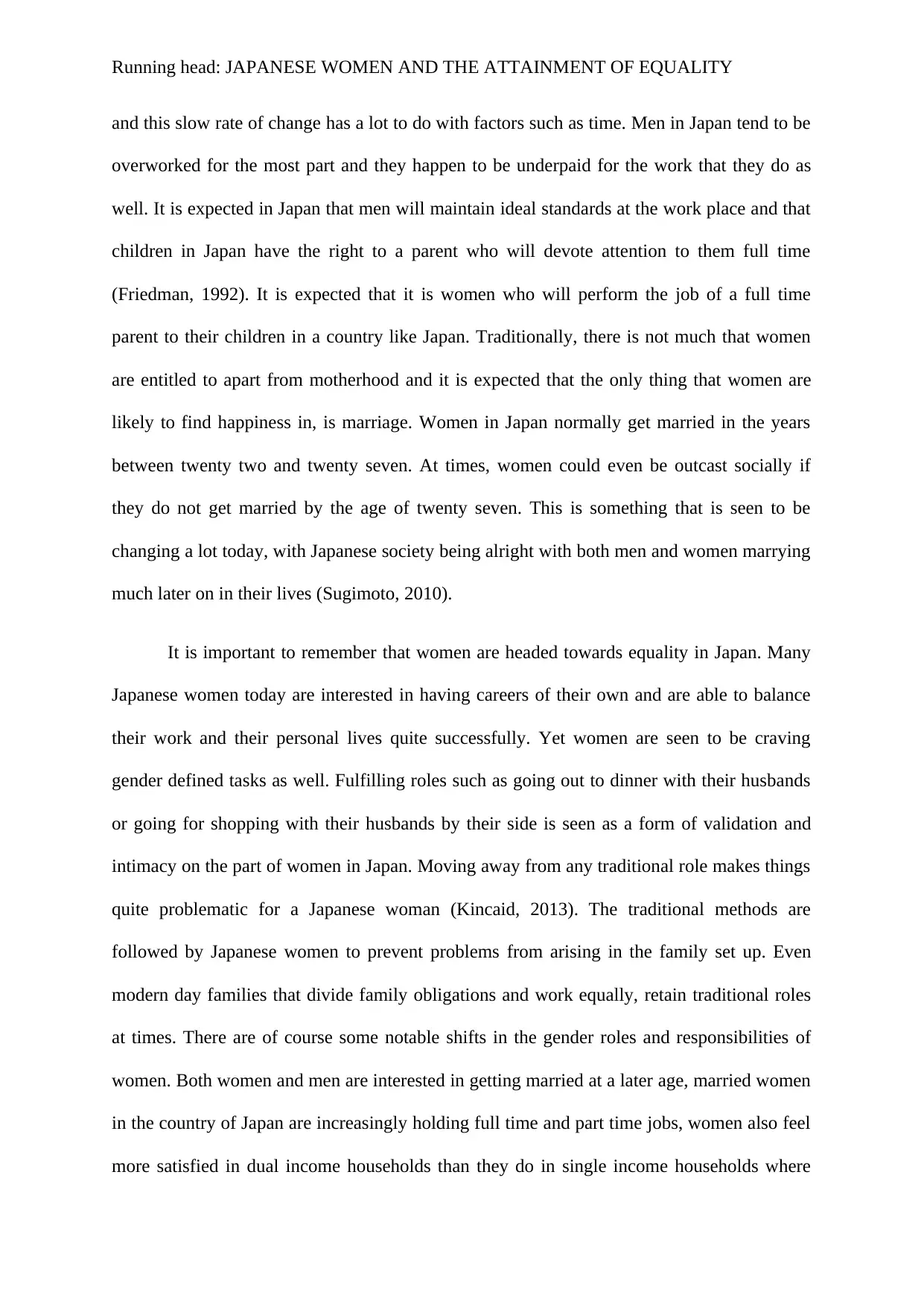
Running head: JAPANESE WOMEN AND THE ATTAINMENT OF EQUALITY
and this slow rate of change has a lot to do with factors such as time. Men in Japan tend to be
overworked for the most part and they happen to be underpaid for the work that they do as
well. It is expected in Japan that men will maintain ideal standards at the work place and that
children in Japan have the right to a parent who will devote attention to them full time
(Friedman, 1992). It is expected that it is women who will perform the job of a full time
parent to their children in a country like Japan. Traditionally, there is not much that women
are entitled to apart from motherhood and it is expected that the only thing that women are
likely to find happiness in, is marriage. Women in Japan normally get married in the years
between twenty two and twenty seven. At times, women could even be outcast socially if
they do not get married by the age of twenty seven. This is something that is seen to be
changing a lot today, with Japanese society being alright with both men and women marrying
much later on in their lives (Sugimoto, 2010).
It is important to remember that women are headed towards equality in Japan. Many
Japanese women today are interested in having careers of their own and are able to balance
their work and their personal lives quite successfully. Yet women are seen to be craving
gender defined tasks as well. Fulfilling roles such as going out to dinner with their husbands
or going for shopping with their husbands by their side is seen as a form of validation and
intimacy on the part of women in Japan. Moving away from any traditional role makes things
quite problematic for a Japanese woman (Kincaid, 2013). The traditional methods are
followed by Japanese women to prevent problems from arising in the family set up. Even
modern day families that divide family obligations and work equally, retain traditional roles
at times. There are of course some notable shifts in the gender roles and responsibilities of
women. Both women and men are interested in getting married at a later age, married women
in the country of Japan are increasingly holding full time and part time jobs, women also feel
more satisfied in dual income households than they do in single income households where
and this slow rate of change has a lot to do with factors such as time. Men in Japan tend to be
overworked for the most part and they happen to be underpaid for the work that they do as
well. It is expected in Japan that men will maintain ideal standards at the work place and that
children in Japan have the right to a parent who will devote attention to them full time
(Friedman, 1992). It is expected that it is women who will perform the job of a full time
parent to their children in a country like Japan. Traditionally, there is not much that women
are entitled to apart from motherhood and it is expected that the only thing that women are
likely to find happiness in, is marriage. Women in Japan normally get married in the years
between twenty two and twenty seven. At times, women could even be outcast socially if
they do not get married by the age of twenty seven. This is something that is seen to be
changing a lot today, with Japanese society being alright with both men and women marrying
much later on in their lives (Sugimoto, 2010).
It is important to remember that women are headed towards equality in Japan. Many
Japanese women today are interested in having careers of their own and are able to balance
their work and their personal lives quite successfully. Yet women are seen to be craving
gender defined tasks as well. Fulfilling roles such as going out to dinner with their husbands
or going for shopping with their husbands by their side is seen as a form of validation and
intimacy on the part of women in Japan. Moving away from any traditional role makes things
quite problematic for a Japanese woman (Kincaid, 2013). The traditional methods are
followed by Japanese women to prevent problems from arising in the family set up. Even
modern day families that divide family obligations and work equally, retain traditional roles
at times. There are of course some notable shifts in the gender roles and responsibilities of
women. Both women and men are interested in getting married at a later age, married women
in the country of Japan are increasingly holding full time and part time jobs, women also feel
more satisfied in dual income households than they do in single income households where
Paraphrase This Document
Need a fresh take? Get an instant paraphrase of this document with our AI Paraphraser
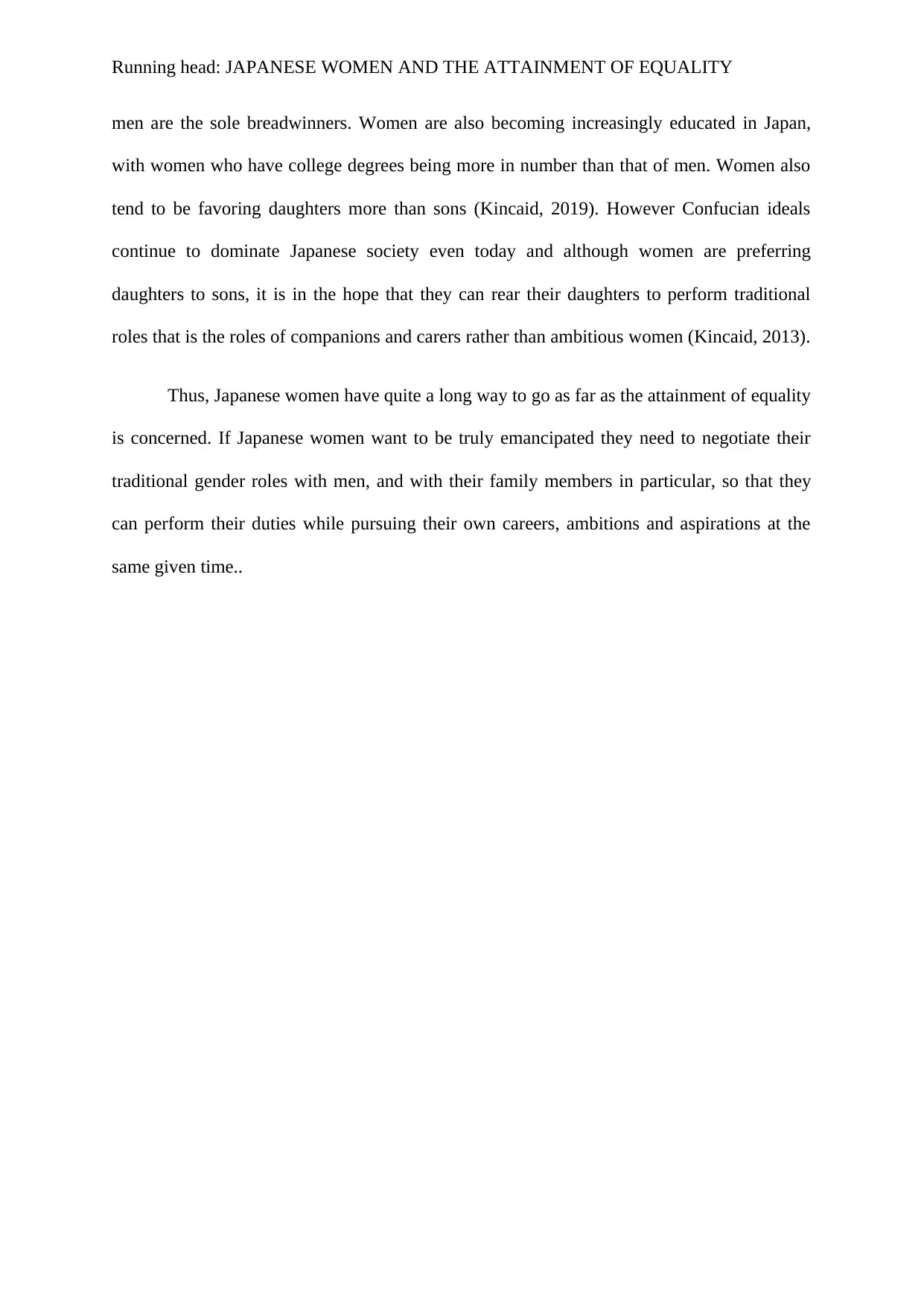
Running head: JAPANESE WOMEN AND THE ATTAINMENT OF EQUALITY
men are the sole breadwinners. Women are also becoming increasingly educated in Japan,
with women who have college degrees being more in number than that of men. Women also
tend to be favoring daughters more than sons (Kincaid, 2019). However Confucian ideals
continue to dominate Japanese society even today and although women are preferring
daughters to sons, it is in the hope that they can rear their daughters to perform traditional
roles that is the roles of companions and carers rather than ambitious women (Kincaid, 2013).
Thus, Japanese women have quite a long way to go as far as the attainment of equality
is concerned. If Japanese women want to be truly emancipated they need to negotiate their
traditional gender roles with men, and with their family members in particular, so that they
can perform their duties while pursuing their own careers, ambitions and aspirations at the
same given time..
men are the sole breadwinners. Women are also becoming increasingly educated in Japan,
with women who have college degrees being more in number than that of men. Women also
tend to be favoring daughters more than sons (Kincaid, 2019). However Confucian ideals
continue to dominate Japanese society even today and although women are preferring
daughters to sons, it is in the hope that they can rear their daughters to perform traditional
roles that is the roles of companions and carers rather than ambitious women (Kincaid, 2013).
Thus, Japanese women have quite a long way to go as far as the attainment of equality
is concerned. If Japanese women want to be truly emancipated they need to negotiate their
traditional gender roles with men, and with their family members in particular, so that they
can perform their duties while pursuing their own careers, ambitions and aspirations at the
same given time..
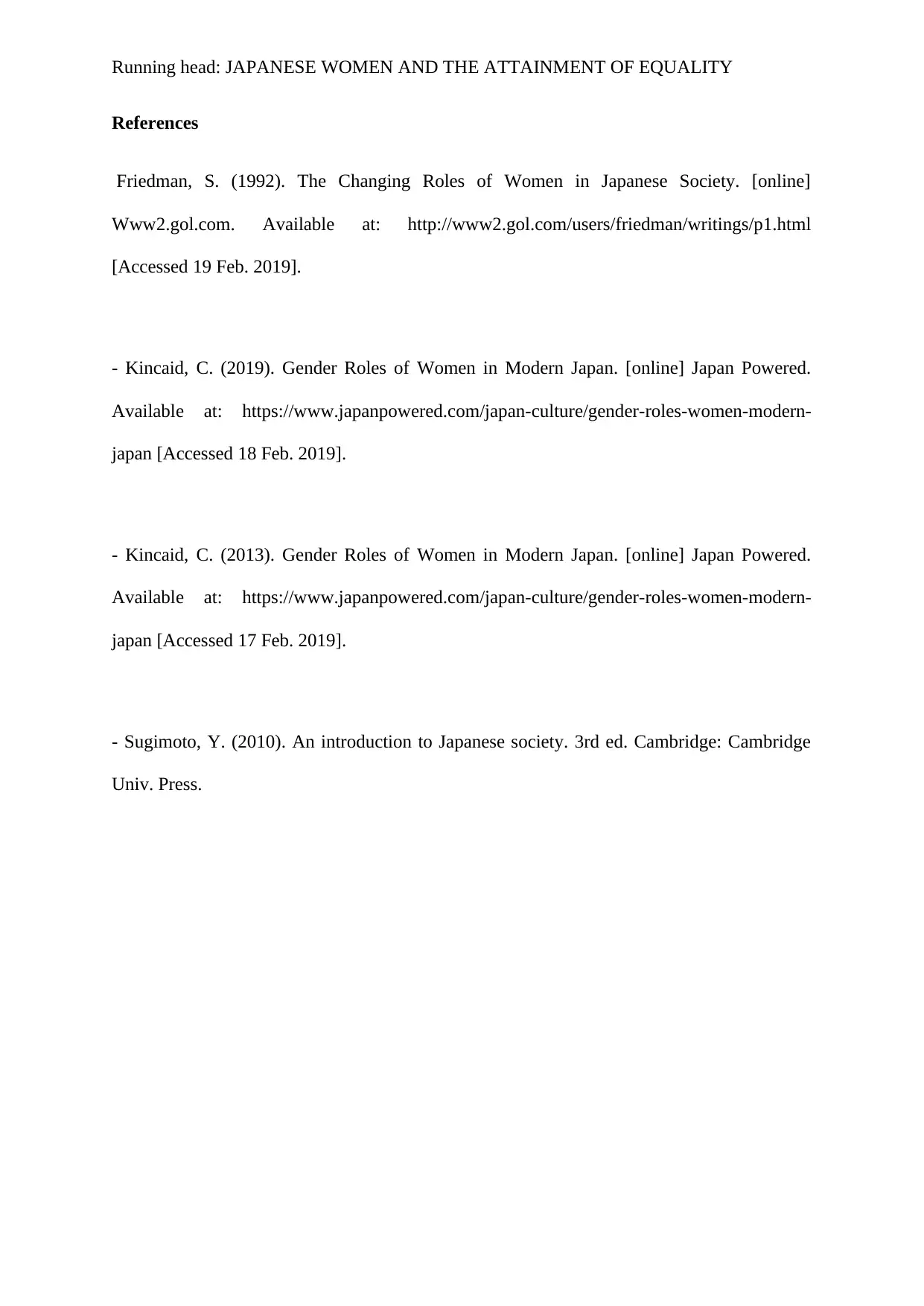
Running head: JAPANESE WOMEN AND THE ATTAINMENT OF EQUALITY
References
Friedman, S. (1992). The Changing Roles of Women in Japanese Society. [online]
Www2.gol.com. Available at: http://www2.gol.com/users/friedman/writings/p1.html
[Accessed 19 Feb. 2019].
- Kincaid, C. (2019). Gender Roles of Women in Modern Japan. [online] Japan Powered.
Available at: https://www.japanpowered.com/japan-culture/gender-roles-women-modern-
japan [Accessed 18 Feb. 2019].
- Kincaid, C. (2013). Gender Roles of Women in Modern Japan. [online] Japan Powered.
Available at: https://www.japanpowered.com/japan-culture/gender-roles-women-modern-
japan [Accessed 17 Feb. 2019].
- Sugimoto, Y. (2010). An introduction to Japanese society. 3rd ed. Cambridge: Cambridge
Univ. Press.
References
Friedman, S. (1992). The Changing Roles of Women in Japanese Society. [online]
Www2.gol.com. Available at: http://www2.gol.com/users/friedman/writings/p1.html
[Accessed 19 Feb. 2019].
- Kincaid, C. (2019). Gender Roles of Women in Modern Japan. [online] Japan Powered.
Available at: https://www.japanpowered.com/japan-culture/gender-roles-women-modern-
japan [Accessed 18 Feb. 2019].
- Kincaid, C. (2013). Gender Roles of Women in Modern Japan. [online] Japan Powered.
Available at: https://www.japanpowered.com/japan-culture/gender-roles-women-modern-
japan [Accessed 17 Feb. 2019].
- Sugimoto, Y. (2010). An introduction to Japanese society. 3rd ed. Cambridge: Cambridge
Univ. Press.
⊘ This is a preview!⊘
Do you want full access?
Subscribe today to unlock all pages.

Trusted by 1+ million students worldwide
1 out of 6
Your All-in-One AI-Powered Toolkit for Academic Success.
+13062052269
info@desklib.com
Available 24*7 on WhatsApp / Email
![[object Object]](/_next/static/media/star-bottom.7253800d.svg)
Unlock your academic potential
Copyright © 2020–2026 A2Z Services. All Rights Reserved. Developed and managed by ZUCOL.
